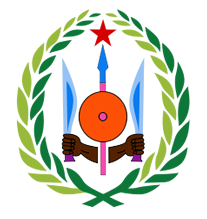Djibouti: Government
Key Figures
- Chief of State:
- President Ismail Omar Guelleh
- Head of Government:
- Prime Minister Abdoulkader Kamil Mohamed
Overview
- Government Name:
- Republic of Djibouti
- Constitution:
- Adopted: 1992; Provides for a semi-presidential regime in which the presidential power is vested in the government, and the legislative power is shared between the government and the parliament.
- Government Type:
- Republic

Index of Economic Freedom
Country Risk Rating
Government Branches
| Main Powers | Election Process | Election Cycle 1 | |
|---|---|---|---|
| Executive | The president serves as the head of state. The government is headed by the prime minister who also heads the council of ministers. |
The president is elected by absolute majority vote through a two-round system. The prime minister is appointed by the president. |
5 years |
| Judicial | The supreme court is independent of the executive and legislature branch. |
The supreme court magistrates are appointed by the president with the advice of the superior council of the magistracy. |
8 year, non-renewable terms |
| Legislative | Power is vested in both the government (council of ministers) and parliament. |
The national assembly has 65 members who are elected by plurality vote in multi-member constituencies. The national assembly is the prominent political force held by a coalition of political parties led by the dominant People's Rally for Progress (PRP). The Front of the Restoration of Unity and Democracy (FRUD) makes up some of the other members of the political coalition. |
5 years |
Regional Trade Blocs
International Organization Participation [2]
Environmental Agreements [3]
Tax Information [2]
- Tax Authority:
- Information not available
- Tax Name:
- Information not available
Sources:
- ElectionGuide http://www.electionguide.org/
- EY, http://www.ey.com
- CIA World Factbook, https://www.cia.gov/the-world-factbook/
- U.S. Bilateral Relations Fact Sheets http://www.state.gov/r/pa/ei/bgn/


